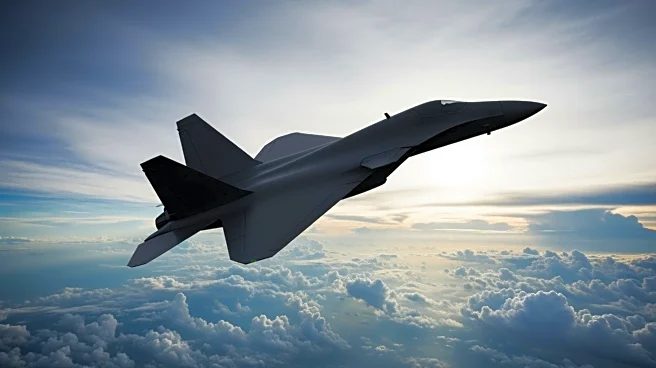What's Happening?
Lockheed Martin is aiming for a significant increase in its F-35 jet deliveries in 2025, targeting up to 200 units as global demand surges. The company has reported a backlog of $179 billion, indicating strong international interest and a robust order
book. This comes after overcoming delays related to Technology Refresh 3 (TR-3) integration issues. Lockheed Martin has already delivered 143 F-35 jets through the third quarter of 2025 and is pacing towards delivering one aircraft per working day. The company has finalized contracts for F-35 Lots 18-19, a $12.5 billion Pentagon deal for 296 jets, and secured major awards for CH-53K helicopters and PAC-3 MSE interceptors.
Why It's Important?
The increase in F-35 deliveries is significant for Lockheed Martin as it reflects growing international demand and strengthens its position as a leading defense contractor. The record backlog of $179 billion suggests sustained interest in advanced military aircraft, which could bolster U.S. defense exports and enhance geopolitical alliances. Countries like Germany and South Korea are expanding their orders, reinforcing European rearmament trends and NATO requirements. This surge in demand could lead to increased revenue and profitability for Lockheed Martin, impacting the U.S. defense industry and related sectors.
What's Next?
Lockheed Martin's ability to meet its ambitious delivery target will depend on maintaining production pace and customer acceptance rates in the fourth quarter of 2025. The company is also focusing on international orders, with Germany planning to purchase additional F-35 jets and South Korea upgrading simulators in partnership with Lockheed Martin. These developments could further diversify demand and stabilize revenue streams beyond U.S. budget cycles. Additionally, Lockheed Martin is vying for strategic missile defense contracts, which could serve as long-term catalysts for growth.
Beyond the Headlines
The push for increased F-35 deliveries highlights the broader geopolitical dynamics influencing defense procurement. As countries bolster their military capabilities, Lockheed Martin's role in supplying advanced technology becomes crucial. The company's strategic positioning in missile defense and aerospace sectors could lead to ethical and policy discussions regarding arms proliferation and international security. Furthermore, the integration of new technologies like TR-3 in military aircraft may drive innovation and set new standards in defense manufacturing.
















